SSM商城项目(五)
1. 学习计划
1、前台系统搭建
2、商城首页展示
3、Cms系统的实现
a) 内容分类管理
b) 内容管理
4、前台内容动态展示
2. 商城首页展示
2.1. 工程搭建
参考e3-manager-web工程,搭建e3-portal-web。

复制e3-manager-web的pom.xml、springmvc.xml和web.xml文件。

2.2导入页面

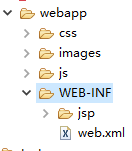
2.3. 功能分析
请求的url:/index
web.xml中的欢迎页配置:

IndexController.java
package cn.e3mall.portal.controller; import org.springframework.stereotype.Controller; import org.springframework.web.bind.annotation.RequestMapping; @Controller public class IndexController { @RequestMapping("/index") public String showIndex(){ return "index"; } }
http://localhost:8083
参数:没有
返回值:String 逻辑视图
测试:
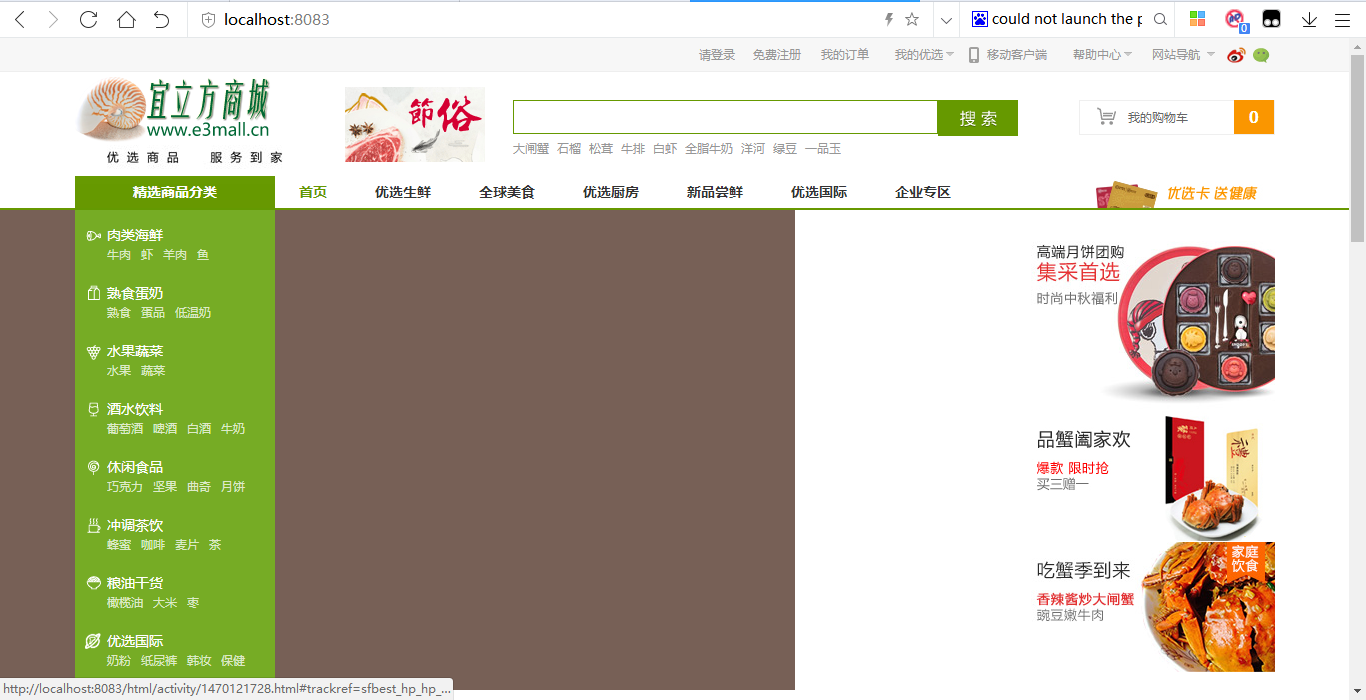
4. 首页动态展示分析
内容信息要从数据库中获得
1、内容需要进行分类
2、分类下有子分类,需要动态管理。
3、分类下有内容列表
4、单点的内容信息
a) 有图片
b) 有链接
c) 有标题
d) 有价格
e) 包含大文本类型,可以作为公告
需要一个内容分类表和一个内容表。内容分类和内容表是一对多的关系。
内容分类表,需要存储树形结构的数据。
内容分类表:tb_content_category
内容表:tb_content
需要有后台来维护内容信息。Cms系统。
需要创建一个内容服务系统。可以参考e3-manager创建。
E3-content:聚合工程打包方式pom
|--e3-content-interface jar
|--e3-content-Service war
4. 内容服务系统创建
4.1. 工程搭建
可以参考e3-manager工程搭建。
e3-content
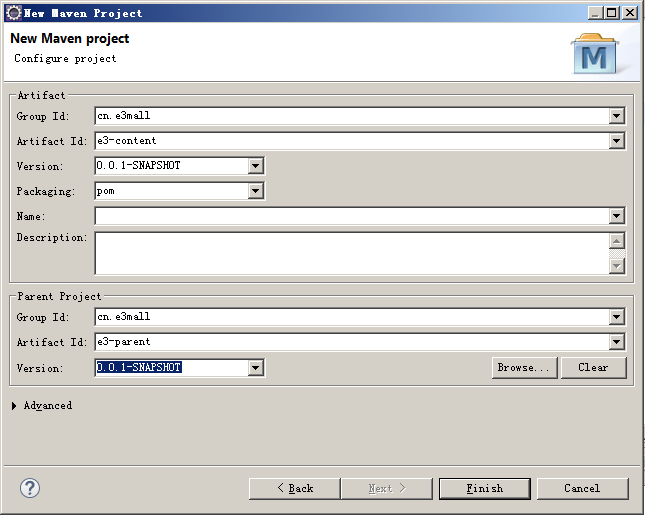
e3-content-interface
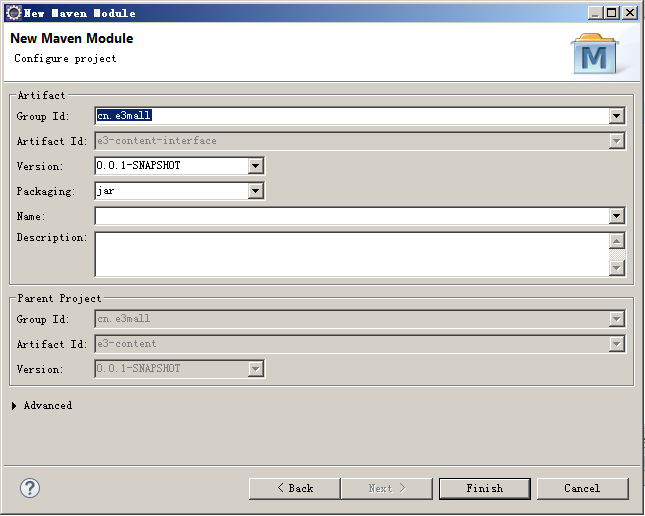
e3-content-service
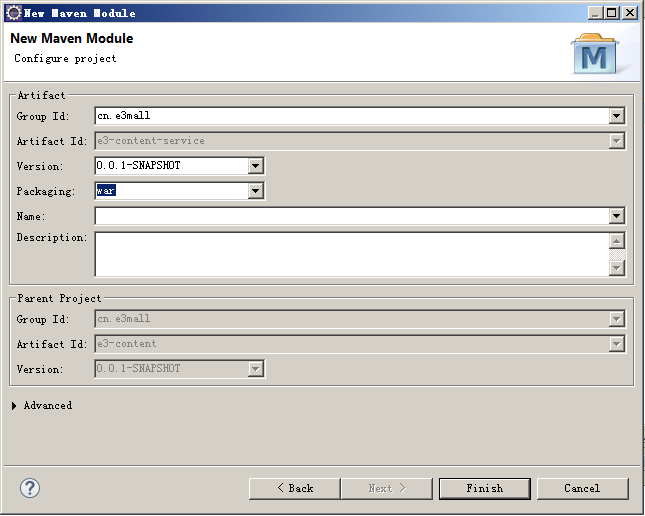
复制e3-manager-service以下文件到e3-content-service下,简单修改applicationContext-service.xml下的包名和接口,修改applicationContext-dao.xml下的部分路径,配置web.xml。
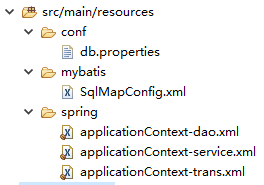
4.2. E3-content
Pom文件
<project xmlns="http://maven.apache.org/POM/4.0.0" xmlns:xsi="http://www.w3.org/2001/XMLSchema-instance" xsi:schemaLocation="http://maven.apache.org/POM/4.0.0 http://maven.apache.org/xsd/maven-4.0.0.xsd"> <modelVersion>4.0.0</modelVersion> <parent> <groupId>cn.e3mall</groupId> <artifactId>e3-parent</artifactId> <version>0.0.1-SNAPSHOT</version> </parent> <artifactId>e3-content</artifactId> <version>0.0.1-SNAPSHOT</version> <packaging>pom</packaging> <dependencies> <dependency> <groupId>cn.e3mall</groupId> <artifactId>e3-common</artifactId> <version>0.0.1-SNAPSHOT</version> </dependency> </dependencies> <modules> <module>e3-content-interface</module> <module>e3-content-service</module> </modules> <!-- 配置tomcat插件 --> <build> <plugins> <plugin> <groupId>org.apache.tomcat.maven</groupId> <artifactId>tomcat7-maven-plugin</artifactId> <configuration> <port>8084</port> <path>/</path> </configuration> </plugin> </plugins> </build> </project>
4.2. E3-content-interface
Pom文件
<project xmlns="http://maven.apache.org/POM/4.0.0" xmlns:xsi="http://www.w3.org/2001/XMLSchema-instance" xsi:schemaLocation="http://maven.apache.org/POM/4.0.0 http://maven.apache.org/xsd/maven-4.0.0.xsd"> <modelVersion>4.0.0</modelVersion> <parent> <groupId>cn.e3mall</groupId> <artifactId>e3-content</artifactId> <version>0.0.1-SNAPSHOT</version> </parent> <artifactId>e3-content-interface</artifactId> <dependencies> <dependency> <groupId>cn.e3mall</groupId> <artifactId>e3-manager-pojo</artifactId> <version>0.0.1-SNAPSHOT</version> </dependency> </dependencies> </project>
4.2. E3-content-service
Pom文件
<project xmlns="http://maven.apache.org/POM/4.0.0" xmlns:xsi="http://www.w3.org/2001/XMLSchema-instance" xsi:schemaLocation="http://maven.apache.org/POM/4.0.0 http://maven.apache.org/xsd/maven-4.0.0.xsd"> <modelVersion>4.0.0</modelVersion> <parent> <groupId>cn.e3mall</groupId> <artifactId>e3-content</artifactId> <version>0.0.1-SNAPSHOT</version> </parent> <artifactId>e3-content-service</artifactId> <packaging>war</packaging> <dependencies> <dependency> <groupId>cn.e3mall</groupId> <artifactId>e3-manager-dao</artifactId> <version>0.0.1-SNAPSHOT</version> </dependency> <dependency> <groupId>cn.e3mall</groupId> <artifactId>e3-content-interface</artifactId> <version>0.0.1-SNAPSHOT</version> </dependency> <!-- spring的依赖 --> <!-- Spring --> <dependency> <groupId>org.springframework</groupId> <artifactId>spring-context</artifactId> </dependency> <dependency> <groupId>org.springframework</groupId> <artifactId>spring-beans</artifactId> </dependency> <dependency> <groupId>org.springframework</groupId> <artifactId>spring-webmvc</artifactId> </dependency> <dependency> <groupId>org.springframework</groupId> <artifactId>spring-jdbc</artifactId> </dependency> <dependency> <groupId>org.springframework</groupId> <artifactId>spring-aspects</artifactId> </dependency> <dependency> <groupId>org.springframework</groupId> <artifactId>spring-jms</artifactId> </dependency> <dependency> <groupId>org.springframework</groupId> <artifactId>spring-context-support</artifactId> </dependency> <!-- dubbo相关 --> <dependency> <groupId>com.alibaba</groupId> <artifactId>dubbo</artifactId> <exclusions> <exclusion> <groupId>org.springframework</groupId> <artifactId>spring</artifactId> </exclusion> <exclusion> <groupId>org.jboss.netty</groupId> <artifactId>netty</artifactId> </exclusion> </exclusions> </dependency> <dependency> <groupId>org.apache.zookeeper</groupId> <artifactId>zookeeper</artifactId> </dependency> <dependency> <groupId>com.github.sgroschupf</groupId> <artifactId>zkclient</artifactId> </dependency> </dependencies> </project>
5. Cms系统实现
5.1. 内容分类管理
5.1.1. 展示内容分类
功能分析
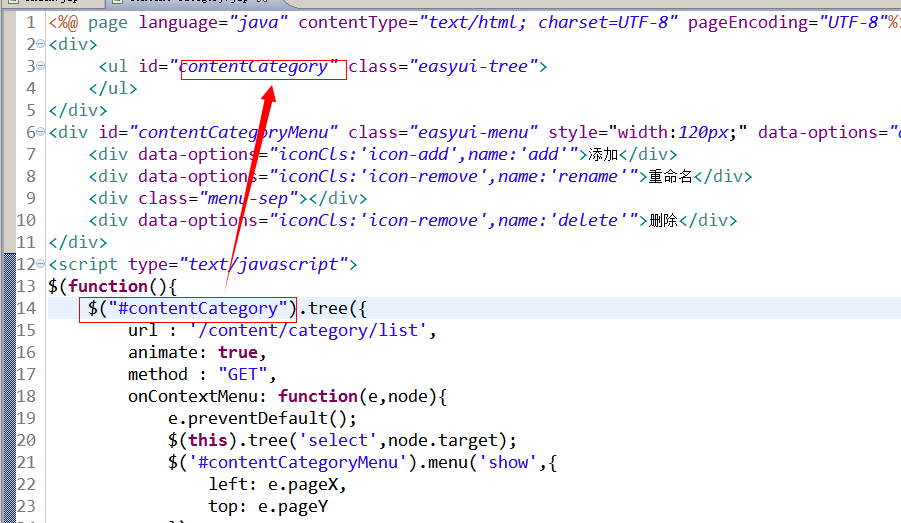
请求的url:/content/category/list
请求的参数:id,当前节点的id。第一次请求是没有参数,需要给默认值“0”
响应数据:List<EasyUITreeNode>(@ResponseBody)
Json数据。
[{id:1,text:节点名称,state:open(closed)},
{id:2,text:节点名称2,state:open(closed)},
{id:3,text:节点名称3,state:open(closed)}]
业务逻辑:
1、取查询参数id,parentId
2、根据parentId查询tb_content_category,查询子节点列表。
3、得到List<TbContentCategory>
4、把列表转换成List<EasyUITreeNode>
Dao层
使用逆向工程
Service
参数:long parentId
返回值:List<EasyUITreeNode>
package cn.e3mall.content.service.impl; import java.util.ArrayList; import java.util.List; import org.springframework.beans.factory.annotation.Autowired; import org.springframework.stereotype.Service; import cn.e3mall.common.pojo.EasyUITreeNode; import cn.e3mall.content.service.ContentCategoryService; import cn.e3mall.mapper.TbContentCategoryMapper; import cn.e3mall.pojo.TbContentCategory; import cn.e3mall.pojo.TbContentCategoryExample; import cn.e3mall.pojo.TbContentCategoryExample.Criteria; @Service public class ContentCategoryServiceImpl implements ContentCategoryService{ @Autowired private TbContentCategoryMapper contentCategoryMapper; @Override public List<EasyUITreeNode> getContentCategoryList(long parentId) { // 1、取查询参数id,parentId // 2、根据parentId查询tb_content_category,查询子节点列表。 TbContentCategoryExample example = new TbContentCategoryExample(); //设置查询条件 Criteria criteria = example.createCriteria(); criteria.andParentIdEqualTo(parentId); //执行查询 // 3、得到List<TbContentCategory> List<TbContentCategory> list = contentCategoryMapper.selectByExample(example); // 4、把列表转换成List<EasyUITreeNode>ub List<EasyUITreeNode> resultList = new ArrayList<>(); for (TbContentCategory tbContentCategory : list) { EasyUITreeNode node = new EasyUITreeNode(); node.setId(tbContentCategory.getId()); node.setText(tbContentCategory.getName()); node.setState(tbContentCategory.getIsParent()?"closed":"open"); //添加到列表 resultList.add(node); } return resultList; } }
发布服务
<!-- 声明需要暴露的服务接口 --> <dubbo:service interface="cn.e3mall.content.service.ContentCategoryService" ref="contentCategoryServiceImpl" timeout="600000"/>
表现层
E3-manager-web
依赖e3-content-interface模块
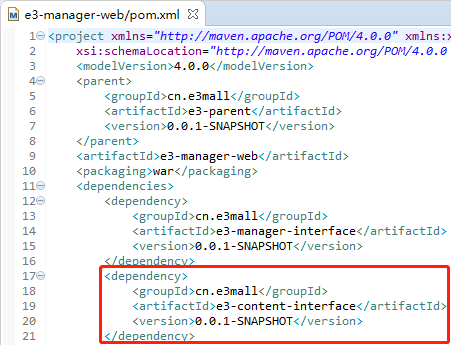
Springmvc.xml中添加服务的引用:
<dubbo:reference interface="cn.e3mall.content.service.ContentCategoryService" id="contentCategoryService"/>
Controller
@RequestMapping("/content/category/list")
@ResponseBody
public List<EasyUITreeNode> getContentCatList(
@RequestParam(value="id", defaultValue="0") Long parentId) {
List<EasyUITreeNode> list = contentCategoryService.getContentCategoryList(parentId);
return list;
}
5.1.2. 新增节点
功能分析
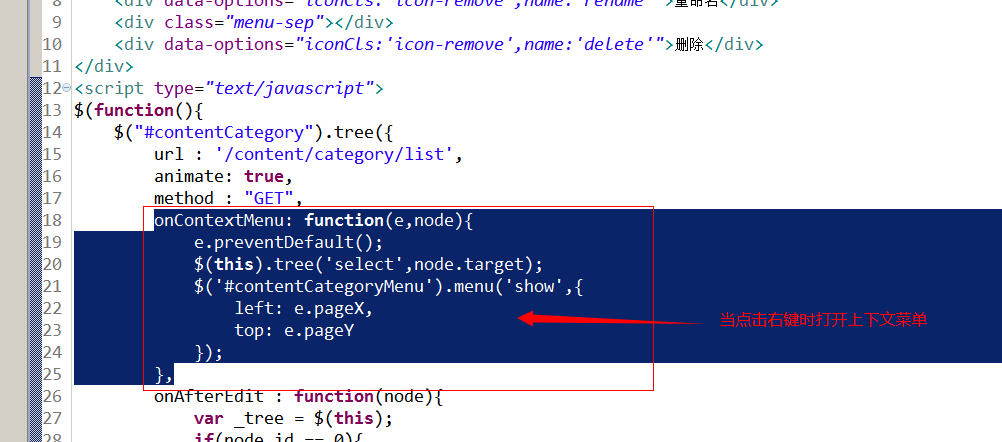
请求的url:/content/category/create
请求的参数:
Long parentId
String name
响应的结果:
json数据,E3Result,其中包含一个对象,对象有id属性,新生产的内容分类id
业务逻辑:
1、接收两个参数:parentId、name
2、向tb_content_category表中插入数据。
a) 创建一个TbContentCategory对象
b) 补全TbContentCategory对象的属性
c) 向tb_content_category表中插入数据
3、判断父节点的isparent是否为true,不是true需要改为true。
4、需要主键返回。
5、返回E3Result,其中包装TbContentCategory对象
Dao层
可以使用逆向工程。
需要添加主键返回:

Service层
参数:parentId、name
返回值:返回E3Result,其中包装TbContentCategory对象
@Override public E3Result addContentCategory(long parentId, String name) { // 1、接收两个参数:parentId、name // 2、向tb_content_category表中插入数据。 // a)创建一个TbContentCategory对象 TbContentCategory tbContentCategory = new TbContentCategory(); // b)补全TbContentCategory对象的属性 tbContentCategory.setIsParent(false); tbContentCategory.setName(name); tbContentCategory.setParentId(parentId); //排列序号,表示同级类目的展现次序,如数值相等则按名称次序排列。取值范围:大于零的整数 tbContentCategory.setSortOrder(1); //状态。可选值:1(正常),2(删除) tbContentCategory.setStatus(1); tbContentCategory.setCreated(new Date()); tbContentCategory.setUpdated(new Date()); // c)向tb_content_category表中插入数据 contentCategoryMapper.insert(tbContentCategory); // 3、判断父节点的isparent是否为true,不是true需要改为true。 TbContentCategory parentNode = contentCategoryMapper.selectByPrimaryKey(parentId); if (!parentNode.getIsParent()) { parentNode.setIsParent(true); //更新父节点 contentCategoryMapper.updateByPrimaryKey(parentNode); } // 4、需要主键返回。 // 5、返回E3Result,其中包装TbContentCategory对象 return E3Result.ok(tbContentCategory); }
发布服务。(前面已经发过了)
表现层
请求的url:/content/category/create
请求的参数:
Long parentId
String name
响应的结果:
json数据,E3Result
@RequestMapping("/create")
@ResponseBody
public E3Result createCategory(Long parentId, String name) {
E3Result result = contentCategoryService.addContentCategory(parentId, name);
return result;
}
5.2. 内容管理
新增内容
功能分析
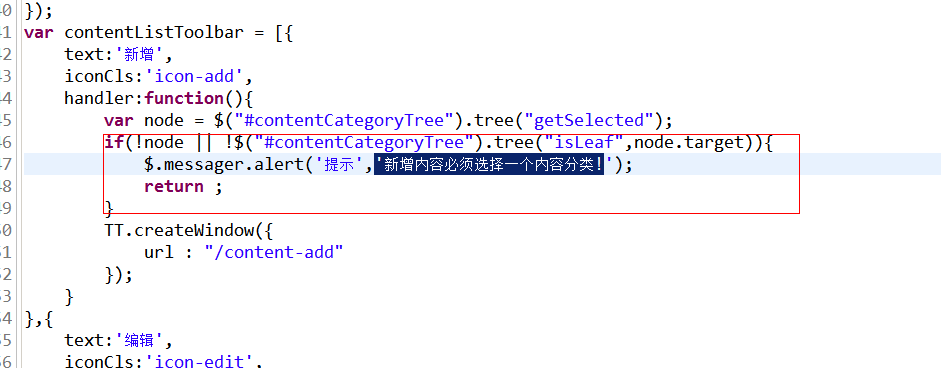
新增内容,必须指定一个内容分类。
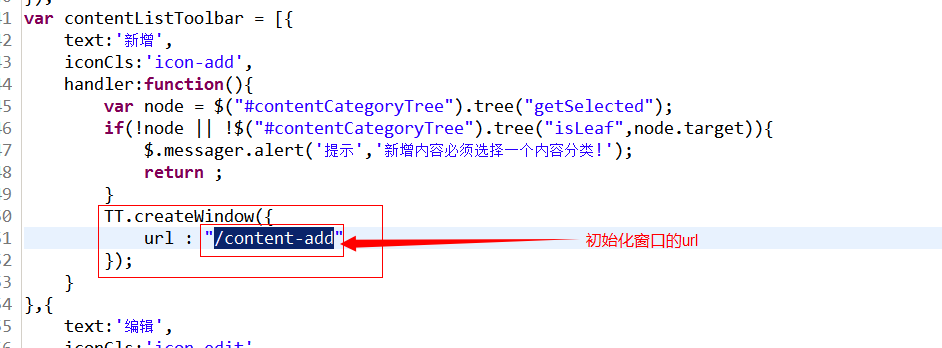
提交表单请求的url:/content/save
参数:表单的数据。使用pojo接收TbContent
返回值:E3Result(json数据)
业务逻辑:
1、把TbContent对象属性补全。
2、向tb_content表中插入数据。
3、返回E3Result
Dao
逆向工程
Service
参数:TbContent
返回值:E3Result
@Service public class ContentServiceImpl implements ContentService { @Autowired private TbContentMapper contentMapper; @Override public E3Result addContent(TbContent content) { //补全属性 content.setCreated(new Date()); content.setUpdated(new Date()); //插入数据 contentMapper.insert(content); return E3Result.ok(); } }
发布服务
<dubbo:service interface="cn.e3mall.content.service.ContentService" ref="contentServiceImpl" timeout="600000"/>
引用服务
<dubbo:reference interface="cn.e3mall.content.service.ContentService" id="contentService" />
Controller
提交表单请求的url:/content/save
参数:表单的数据。使用pojo接收TbContent
返回值:E3Result(json数据)
@Controller public class ContentController { @Autowired private ContentService contentService; @RequestMapping("/content/save") @ResponseBody public E3Result addContent(TbContent content) { E3Result result = contentService.addContent(content); return result; } }

